Rivian R1S SUV and R1T Pick-up thread
#213
*sigh*.......on the one hand it's to be expected since startup and EV and all that so low quality and lack of attention is to be expected. On the other hand I have a lot of money into them so it would be nice to not have them crash.
#214
Clickbait video
https://www.rivianforums.com/forum/t...vian-r1t.6381/
Original post that started it. Dude has a size 14 foot, catches it on the pedal on his foot, yanks his foot out, torques the pedal to the side, and it breaks. Is it ideal? No, but I'd say that's an unusual use case
https://www.rivianforums.com/forum/t...vian-r1t.6381/
Original post that started it. Dude has a size 14 foot, catches it on the pedal on his foot, yanks his foot out, torques the pedal to the side, and it breaks. Is it ideal? No, but I'd say that's an unusual use case
#215

WINDHAM, N.Y. – There aren’t a lot of options in the seven-passenger, fully-electric SUV market, but startup automaker Rivian is working to change that with the launch of its second vehicle, the 2022 Rivian R1S SUV. We spent a few days in midstate New York to find out just how it performs both on-road and off.
On the road, the Rivian R1S is surprisingly agile and comfortable without being numb. Rivian sent us off in the second most-expensive model available, with quad motors and the larger battery pack. Each wheel is effectively powered by its own motor, allowing for independent torque vectoring front and rear. The motors that power the front wheels put out 415 horsepower with 435 pound-feet of torque, while the rear motors put out 420 horsepower and 495 lb-ft of torque, giving the quad-motor R1S a tremendous total of 835 horsepower and 908 lb-ft of torque. A 0-60-mph sprint takes an estimated 3 seconds.
Underpinning the R1S is a choice of battery packs: A standard pack that gives you around 260 miles of range, a large pack (which was in the vehicle we drove) that Rivian says gives an EPA-estimated range of 316 miles, and a max pack that should get around 400 or more miles of range.
Our test drives took us from Windham, N.Y., down to Monticello, N.Y., on a route clogged by construction, pedestrians and small towns with low speed limits. Getting a full taste for those 835 horses was therefore difficult, but a few short acceleration runs at least hinted at how quick the R1S can be. The more lasting on-road impression was just how little wind noise makes its way into the cabin at highway speeds.
On the road, the Rivian R1S is surprisingly agile and comfortable without being numb. Rivian sent us off in the second most-expensive model available, with quad motors and the larger battery pack. Each wheel is effectively powered by its own motor, allowing for independent torque vectoring front and rear. The motors that power the front wheels put out 415 horsepower with 435 pound-feet of torque, while the rear motors put out 420 horsepower and 495 lb-ft of torque, giving the quad-motor R1S a tremendous total of 835 horsepower and 908 lb-ft of torque. A 0-60-mph sprint takes an estimated 3 seconds.
Underpinning the R1S is a choice of battery packs: A standard pack that gives you around 260 miles of range, a large pack (which was in the vehicle we drove) that Rivian says gives an EPA-estimated range of 316 miles, and a max pack that should get around 400 or more miles of range.
Our test drives took us from Windham, N.Y., down to Monticello, N.Y., on a route clogged by construction, pedestrians and small towns with low speed limits. Getting a full taste for those 835 horses was therefore difficult, but a few short acceleration runs at least hinted at how quick the R1S can be. The more lasting on-road impression was just how little wind noise makes its way into the cabin at highway speeds.
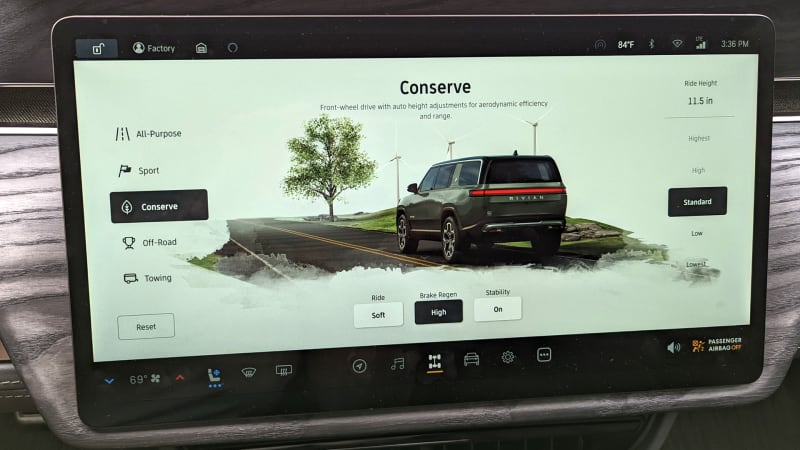
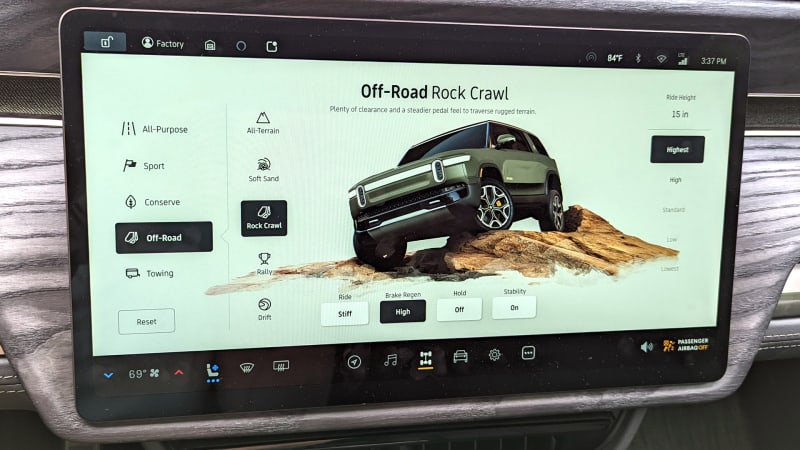
The R1S has 10 driving modes, including All-Purpose, Sport, Conserve, Off-Road, and Towing, with a collection of sub modes beneath Off-Road. The Soft Sand mode under the Off-Road section is new, and was launched as an over-the-air update, after feedback from the Rebelle Rally Team that ran the R1T in the women-only off-road navigational rally last October, which I also participated in. Along those lines, Rivian has been delivering R1S vehicles to employees first so they can work out the last few bugs before putting them into customers hands, and the company takes feedback very seriously.
In addition to these modes, there is also a Drift Mode, which we got to experience from the passenger seat in an R1T driven by Max Koff, the Director of Vehicle Dynamics. The R1S also gets Drift Mode, but Rivian said it didn’t put it on display for journalists because the R1S apparently becomes “more mid-engine-oriented” in Drift Mode, and conditions at the track weren’t suited to keeping the R1S in a slide.
Selecting from the menu of drive modes is done using the 15.6-inch touchscreen, which also controls virtually everything else: infotainment, climate, seat positioning and mirrors, plus details about efficiency and state of charge. There are no buttons except a pair of rockers on each side of the steering wheel in the R1S, much like the R1T. In fact, from the front seat, both the interior of the pickup and the SUV look identical.
In each mode, you can customize ride height (ranging from 9.5 inches in Lowest to 15 inches in Highest), and three levels of brake regen using the touchscreen. All-Purpose and Sport modes were our favorite for the on-road portion of the drive, as these two modes provided enough steering feedback and control, while not jostling passengers. The most uncomfortable mode was Conserve mode, which lowers the R1S to its lowest clearance height and puts it into front-wheel-drive mode with the highest regenerative braking. Rivian Engineers confirmed that Conserve mode is really best suited for smooth highway driving, not the winding single-lane roads of our drive because, at its lowest suspension height, the R1S translates nearly every undulation and bump directly into the cabin. Without any towing to do during this test, Tow Mode went unused, but the setup would’ve kept the R1S in AWD and put down the maximum torque.
Off-road, the R1S is impressively capable, much as we discovered the Rivian R1T to be during a more extensive off-road journey than we managed in New York. In the R1S, we ran a short, lightly technical, off-road course set up by Rivian at the Monticello Motor Club, back-to-back in the R1S and the R1T. The shorter R1S made it easier to maneuver across a small creek and up a steep, sandy grade, though the R1T felt more sure-footed on the same route. The Off-road modes are very well dialed in and certainly make off-roading far more attainable for first timers and families.
In addition to these modes, there is also a Drift Mode, which we got to experience from the passenger seat in an R1T driven by Max Koff, the Director of Vehicle Dynamics. The R1S also gets Drift Mode, but Rivian said it didn’t put it on display for journalists because the R1S apparently becomes “more mid-engine-oriented” in Drift Mode, and conditions at the track weren’t suited to keeping the R1S in a slide.
Selecting from the menu of drive modes is done using the 15.6-inch touchscreen, which also controls virtually everything else: infotainment, climate, seat positioning and mirrors, plus details about efficiency and state of charge. There are no buttons except a pair of rockers on each side of the steering wheel in the R1S, much like the R1T. In fact, from the front seat, both the interior of the pickup and the SUV look identical.
In each mode, you can customize ride height (ranging from 9.5 inches in Lowest to 15 inches in Highest), and three levels of brake regen using the touchscreen. All-Purpose and Sport modes were our favorite for the on-road portion of the drive, as these two modes provided enough steering feedback and control, while not jostling passengers. The most uncomfortable mode was Conserve mode, which lowers the R1S to its lowest clearance height and puts it into front-wheel-drive mode with the highest regenerative braking. Rivian Engineers confirmed that Conserve mode is really best suited for smooth highway driving, not the winding single-lane roads of our drive because, at its lowest suspension height, the R1S translates nearly every undulation and bump directly into the cabin. Without any towing to do during this test, Tow Mode went unused, but the setup would’ve kept the R1S in AWD and put down the maximum torque.
Off-road, the R1S is impressively capable, much as we discovered the Rivian R1T to be during a more extensive off-road journey than we managed in New York. In the R1S, we ran a short, lightly technical, off-road course set up by Rivian at the Monticello Motor Club, back-to-back in the R1S and the R1T. The shorter R1S made it easier to maneuver across a small creek and up a steep, sandy grade, though the R1T felt more sure-footed on the same route. The Off-road modes are very well dialed in and certainly make off-roading far more attainable for first timers and families.
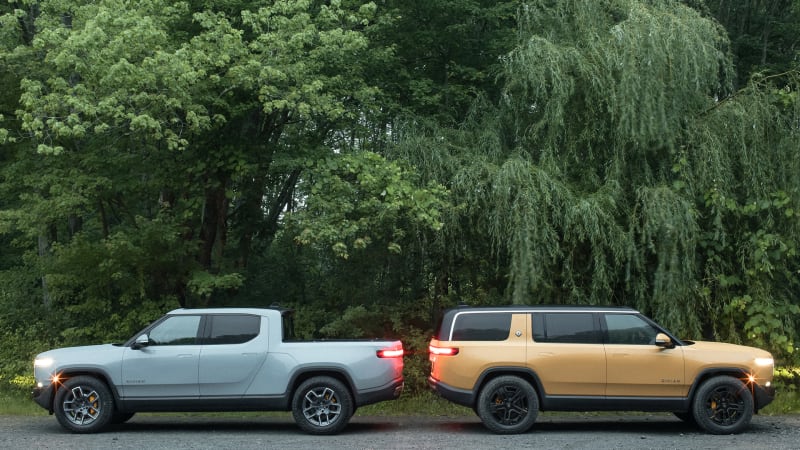
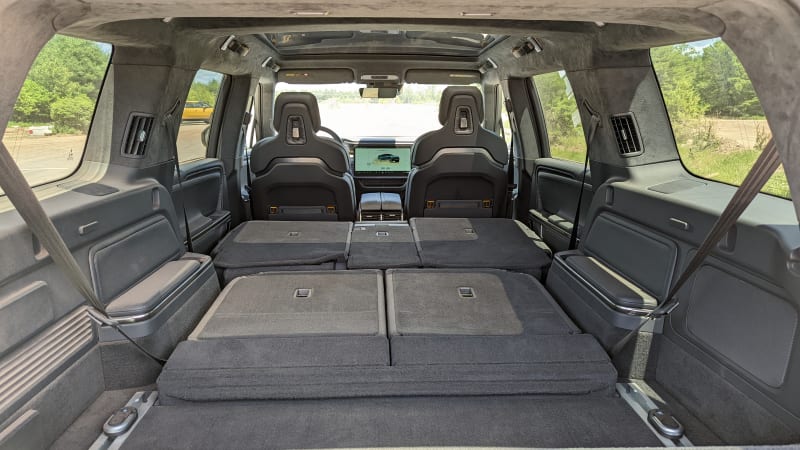
From the outside, the R1S shares a lot of visual cues with the Rivian R1T. The R1S, however, is a full 17.1 inches shorter than its pickup sibling, but still packs plenty of usable space inside. With both rear seating rows lowered, there’s 88.2 cubic-feet of cargo capacity, which is roughly what you’d get in a Kia Telluride and Volvo XC90. Despite the length difference, the curb weight of just under 7,000 pounds is the same for both the R1T and R1S.
The R1S gets the same lighting signature, both front and rear, as the R1T, with looping daytime running lights that run horizontally from side to side. It also gets a massive panoramic roof, as standard across the model line. That glass portion stretches from the front to rear seats making the interior feel open and airy, which is quite nice when sitting in the rear seats. Unfortunately, there is no sunshade for that glass panel, and although Rivian initially promised an electrochromic glass roof that would go opaque at the press of a button (presumably in the touchscreen), that feature apparently never made it to production. As is, there is only tinted glass between you and the sun, which is just not enough. Then again, this is also a trend we've seen elsewhere in the electric car arena (Mustang Mach-E, various Teslas) and it's not a good one.
Second-row seating is a 40/20/40-split setup with ample legroom for a pair of 6-foot adults to fit comfortably there for a long ride. The seats are firm but comfortable, and the seatbacks tilt to provide more comfort. The outboard seats slide to increase space for cargo or third-row passengers.
Those passengers should ideally be smaller adults, though a long ride back there for anyone could become uncomfortable pretty quickly. At 5-foot-7, I could sit back there, as long as the passenger in front of me didn’t slide the second-row seat all the way back. To access the third row, you pull a lever at the shoulder of the second row to slide and fold the seat forward. It’s not an elegant entry, but it’s doable if you’re nimble.
The R1S gets the same lighting signature, both front and rear, as the R1T, with looping daytime running lights that run horizontally from side to side. It also gets a massive panoramic roof, as standard across the model line. That glass portion stretches from the front to rear seats making the interior feel open and airy, which is quite nice when sitting in the rear seats. Unfortunately, there is no sunshade for that glass panel, and although Rivian initially promised an electrochromic glass roof that would go opaque at the press of a button (presumably in the touchscreen), that feature apparently never made it to production. As is, there is only tinted glass between you and the sun, which is just not enough. Then again, this is also a trend we've seen elsewhere in the electric car arena (Mustang Mach-E, various Teslas) and it's not a good one.
Second-row seating is a 40/20/40-split setup with ample legroom for a pair of 6-foot adults to fit comfortably there for a long ride. The seats are firm but comfortable, and the seatbacks tilt to provide more comfort. The outboard seats slide to increase space for cargo or third-row passengers.
Those passengers should ideally be smaller adults, though a long ride back there for anyone could become uncomfortable pretty quickly. At 5-foot-7, I could sit back there, as long as the passenger in front of me didn’t slide the second-row seat all the way back. To access the third row, you pull a lever at the shoulder of the second row to slide and fold the seat forward. It’s not an elegant entry, but it’s doable if you’re nimble.
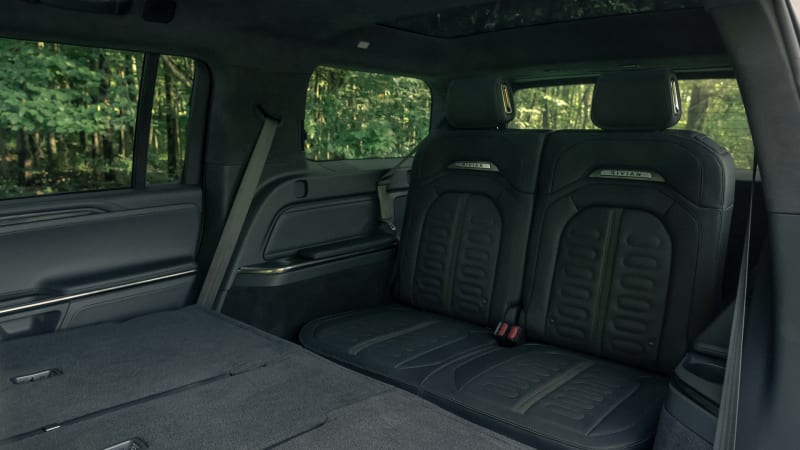
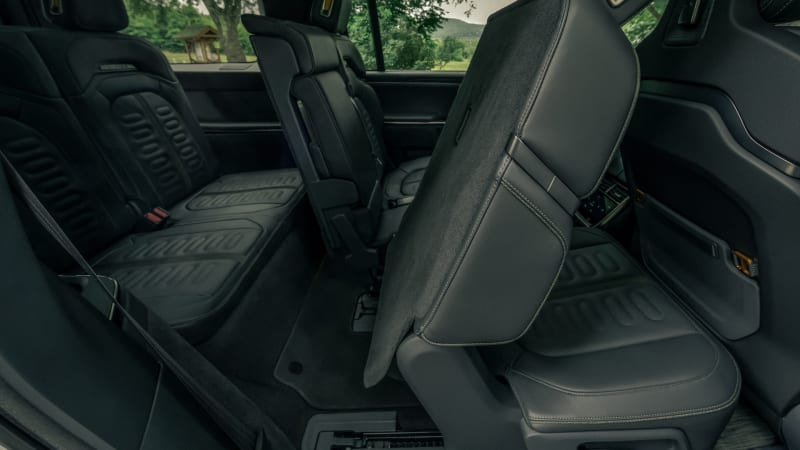
Entry and exit in general can be awkward, including for the front seats *– the high floor and low roofline make for an unusual combination of ducking to clear your head while also drawing your knees to your chest. The second row, however, is easier to enter and exit, and Rivian set up a test vehicle with a baby seat and a booster seat, which demonstrated how easy it would be to put wiggly kids into safe second-row seats.
There are eight USB-C ports conveniently located throughout the R1S, too. Most notable are the two at the rear of the front seat headrests so parents can plug in tablets for antsy munchkins on long road trips. There are also two hidden USB-C ports in the third-row underneath a pair of armrests that also hide convenient storage for tablets.
There is also a camp speaker that doubles as a lantern, and a flashlight hidden, much like the umbrella in a Rolls-Royce, in the edge of the driver-side door. Of course, since the R1S is an all-electric vehicle, you get a front trunk with 11.1 cubic feet of storage space, ample enough for a pair of rollaboard suitcases to fit inside. There is 17.6 cubic feet of luggage space with the third row up (comparable to a Hyundai Palisade on paper) with space under floor for the optional spare tire and a first aid kit. The spilt tailgate holds up to 500 pounds and sits near a couple of power outlets and more USB-C ports so you can sit on the tailgate and enjoy the weather, but still have power.
There are eight USB-C ports conveniently located throughout the R1S, too. Most notable are the two at the rear of the front seat headrests so parents can plug in tablets for antsy munchkins on long road trips. There are also two hidden USB-C ports in the third-row underneath a pair of armrests that also hide convenient storage for tablets.
There is also a camp speaker that doubles as a lantern, and a flashlight hidden, much like the umbrella in a Rolls-Royce, in the edge of the driver-side door. Of course, since the R1S is an all-electric vehicle, you get a front trunk with 11.1 cubic feet of storage space, ample enough for a pair of rollaboard suitcases to fit inside. There is 17.6 cubic feet of luggage space with the third row up (comparable to a Hyundai Palisade on paper) with space under floor for the optional spare tire and a first aid kit. The spilt tailgate holds up to 500 pounds and sits near a couple of power outlets and more USB-C ports so you can sit on the tailgate and enjoy the weather, but still have power.
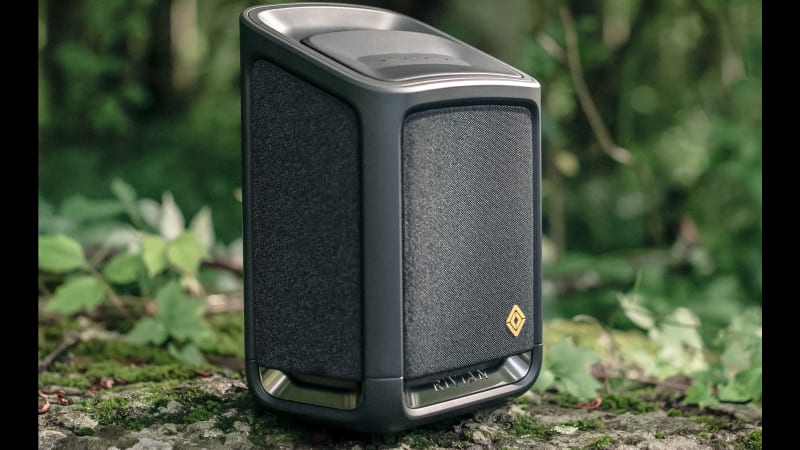
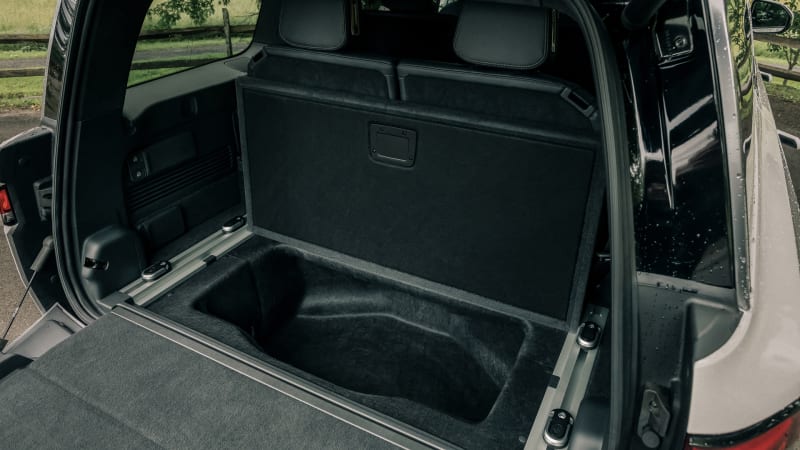
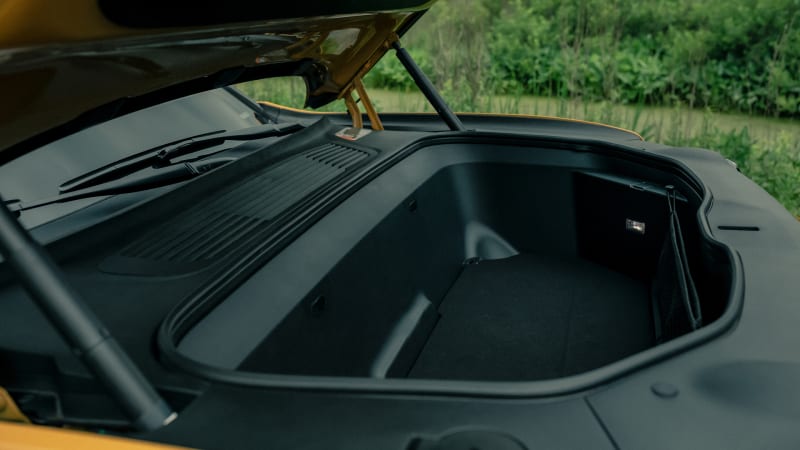
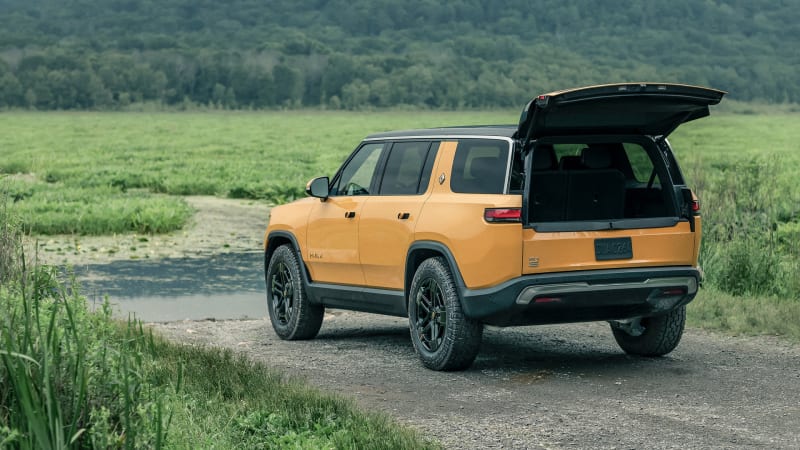
While the R1S is capable, comfortable and unique in the full-size SUV space thanks to its all-electric powertrain, Rivian is still very much in startup mode, and there continue to be a few small niggling things that the company is continuing to work out, even as consumers begin to take deliveries. Basically, there are bugs to be sorted, mostly of the software kind. We experienced an unresponsive rear-climate control system where no amount of locking or unlocking from the front touchscreen would allow the rear 6.5-inch touchscreen to function. Rivian is hoping that sending its early R1S builds to employees can help sniff out as many of these bugs as possible.
Additionally, both Apple Carplay and Android Auto are unavailable in Rivian vehicles, just as in Teslas. You can, however, use Alexa to control everything from climate to navigation, once you sign into your Amazon account.
Rivian recently raised the prices on all of its vehicles, which the company says is in order to meet the rising costs of components. The base Explore model starts at $73,575, including destination, but not the $7,500 federal tax credit. That model gets the dual-motor all-wheel-drive setup with the standard battery pack. If you want a dual-motor all-wheel drive with the large pack, you’ll need to pony up an additional $6,000 to drop $79,575. The upper Adventure trim adds a further $5,500 to the bill, while the top-of-the-line quad motor with max picks starts at $85,575.
Additionally, both Apple Carplay and Android Auto are unavailable in Rivian vehicles, just as in Teslas. You can, however, use Alexa to control everything from climate to navigation, once you sign into your Amazon account.
Rivian recently raised the prices on all of its vehicles, which the company says is in order to meet the rising costs of components. The base Explore model starts at $73,575, including destination, but not the $7,500 federal tax credit. That model gets the dual-motor all-wheel-drive setup with the standard battery pack. If you want a dual-motor all-wheel drive with the large pack, you’ll need to pony up an additional $6,000 to drop $79,575. The upper Adventure trim adds a further $5,500 to the bill, while the top-of-the-line quad motor with max picks starts at $85,575.
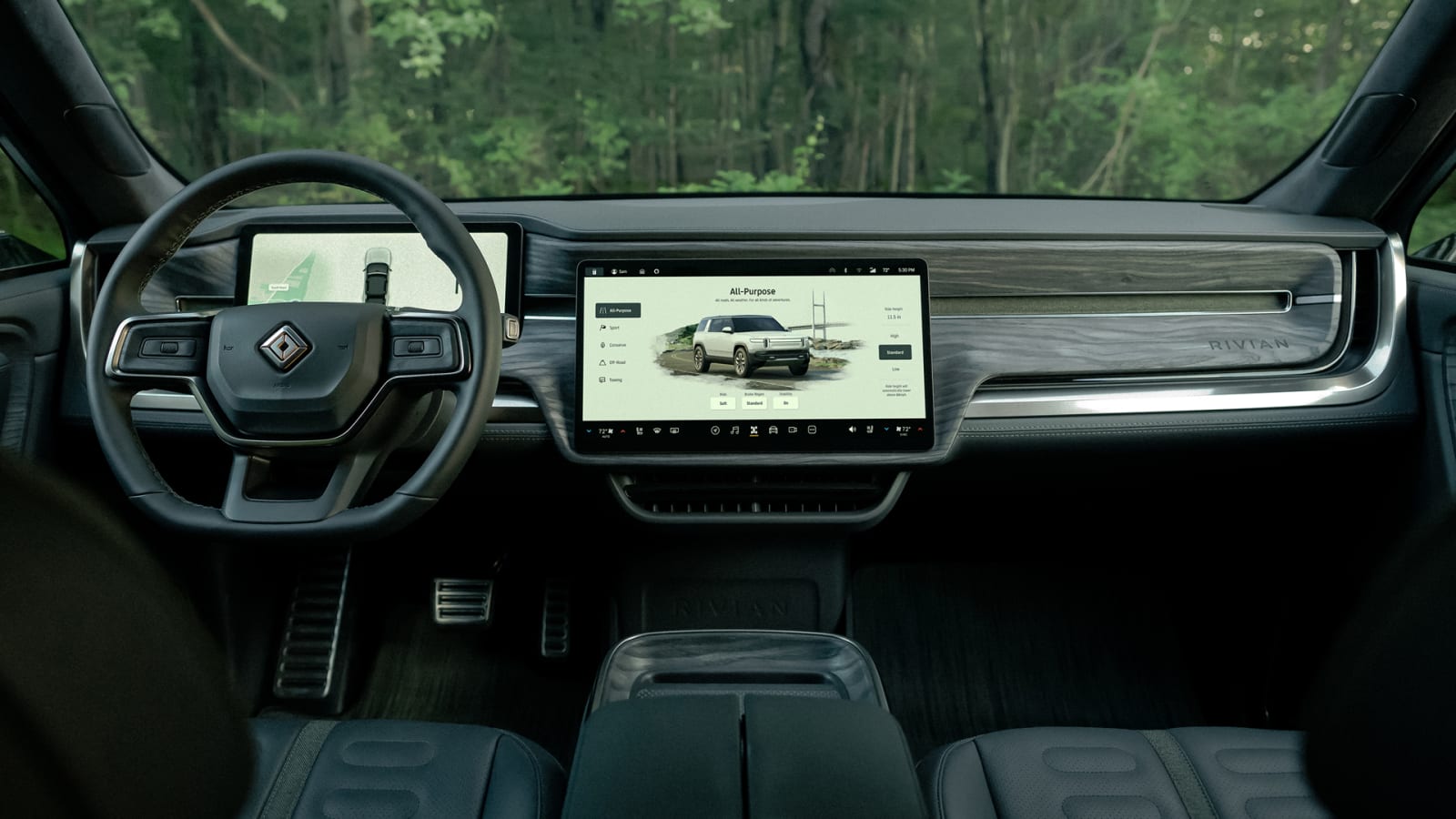
Then come the options. If you want interior colors that are anything other than the standard black, you’ll need to add $2,000 to your price. Plan to take your R1S off-road? Opt for the Adventure line that includes skid plates and tow hooks, or you can add them à la carte (another $2,000). You may also want to add a compact spare that fits under the rear cargo area ($550), and maybe some rescue gear ($600) that includes soft shackles, a pair of long and short tow straps, a hard shackle, and a special Rivian-branded hitch link and pin.
For comparison, the base R1S starts $5,000 higher than the base R1T (dual motor/AWD with the standard pack), but the range-topping R1T with the quad motor and max battery pack starts a bit higher at $90,575. Add on off-roady bits to the R1T (or the Camp Kitchen!) from there, and the price climbs quickly.
Rivian notes that deliveries for the most affordable R1S with the standard pack/dual-motor setup are “projected” to start in 2024 (same as the R1T). However, if you want to place an order for a quad-motor/max-pack R1S today, Rivian says deliveries for new reservations would begin in late 2023. Should you be one of the roughly 90,000 people with existing preorders/reservations, Rivian has a target production of only 25,000 in 2022. Basically, most of those already waiting in line are going to be waiting quite a while. Now, should you somehow be at the front of that line, deliveries should start later this summer.
While delays are not uncommon in today’s environment with continued supply and chip shortages, it will remain to be seen if customers are willing to wait to take delivery. The forums have been flooded with plenty of reservation holders complaining about continued delivery delays, and, unfortunately, the public generally doesn’t always have a lot of patience for these things.
While the cost for a 2022 Rivian R1S is high, the range, capability, comfort and space are worth it, especially if you’re looking for a vehicle from a company that appears to be really trying to both offer unique, thoughtful, functional features in the all-electric space, and inspire people to have more adventures both on and off the beaten path.
For comparison, the base R1S starts $5,000 higher than the base R1T (dual motor/AWD with the standard pack), but the range-topping R1T with the quad motor and max battery pack starts a bit higher at $90,575. Add on off-roady bits to the R1T (or the Camp Kitchen!) from there, and the price climbs quickly.
Rivian notes that deliveries for the most affordable R1S with the standard pack/dual-motor setup are “projected” to start in 2024 (same as the R1T). However, if you want to place an order for a quad-motor/max-pack R1S today, Rivian says deliveries for new reservations would begin in late 2023. Should you be one of the roughly 90,000 people with existing preorders/reservations, Rivian has a target production of only 25,000 in 2022. Basically, most of those already waiting in line are going to be waiting quite a while. Now, should you somehow be at the front of that line, deliveries should start later this summer.
While delays are not uncommon in today’s environment with continued supply and chip shortages, it will remain to be seen if customers are willing to wait to take delivery. The forums have been flooded with plenty of reservation holders complaining about continued delivery delays, and, unfortunately, the public generally doesn’t always have a lot of patience for these things.
While the cost for a 2022 Rivian R1S is high, the range, capability, comfort and space are worth it, especially if you’re looking for a vehicle from a company that appears to be really trying to both offer unique, thoughtful, functional features in the all-electric space, and inspire people to have more adventures both on and off the beaten path.
#218
i saw the R1S months ago (albeit in camo) but that's bc i live 1 city away from their HQ.
it does have presence but does anyone else see jeep wagoneer? even the headlights/DRLs can get confused for a wrangler!
it does have presence but does anyone else see jeep wagoneer? even the headlights/DRLs can get confused for a wrangler!
#220
#224
I doubt anyone will remember the name of this company in 5yrs.

#225
It's true that Motor Trend, like some other car magazines, accepts advertising (Consumer Reports doesn't), but I don't think that it really has that much affect on the vehicle-reviews. If it did, it would violate the ethic standards of journalism....and, be, in effect, a bribe. Besides, most of the reviewers in the magazines get paid the same no matter how they rate the products....their salaries are usually determined by a contract with the magazine's owner.
Well.....that's what was once said about Tesla.
Well.....that's what was once said about Tesla.

Its one thing to make 100k car per year and completely different to make millions per year sold around the globe. Tesla has been a huge success story but they also have a rabid fan base and have been able to be a transcendent company where ppl who know nothing about cars know what a Tesla is.





